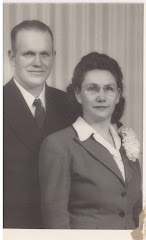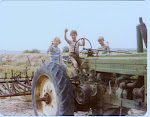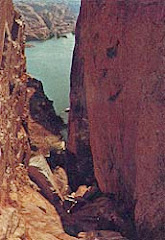 |
| "Mr. Steamer Chest" |
By Julia Whitney 1940
A story about Ellen McKell Matheson written by a great-granddaughter, Julia Whitney Rawlins
This was Mr. Streamer Chest boasting of his usefulness to Jane. She wasn’t a common Jane with mouse-colored hair and plain features. She was a “flaxen-haired, one-time-pretty-faced” wax doll. Although she bore the marks of hard usage, she still carried herself with the dignity and charm of a large wax doll.
Anyone observing would have noted the look of disgust, followed quickly by tolerance, that passed over Jane’s face. She had been in the family longer and had been a more intimate member of the family than had the trunk, but she said nothing. She was thinking of that crisp October day in 1853, when she was sitting in the shop window, all new and pleasing to the eye. She had been lonely then, but not since.
Steamer Chest became impatient. Why didn’t that Jane say something? His conscience annoyed him, for he was remembering certain things which made him wish he could recall the words just spoken.
He was about to speak when Jane began, “I was thrilled that morning in 1858 when a nice-looking sailor man came in and gave me a critical glance. But the thrill was even greater when Daniel Matheson took me home to his dark-eyed, dark-haired sister.
“Ellen-- for that was her name-- was eight years old. Daniel Matheson was her father and Catherine Treasurer Matheson, her mother. Ellen’s full name is Ellen McKell Matheson and she was the eighteenth child. At Ellen’s eighth birthday, the Matheson’s were still living at the place of her birth, Edinburgh, Scotland.
Long before this birthday was over, I knew my affection for Ellen would never end. I loved her sweet voice and I could listen to her sing hour on hour and never grow weary.
Ellen’s father came home the night after I arrived. He was a jolly, but deeply thoughtful man. He was educated as a Presbyterian minister, and he traveled about, preaching in one of his several languages that suited the audience.
Since Ellen’s mother worked at a factory, we, with the other children of working mothers, spent our time in a day nursery.
A few months passed. One night a Mr. Albert Carrington came to the house and announced himself as a Mormon missionary. The folks (they were my folks by now because I loved them so) my folks invited him in and he talked with us. We liked to listen to him. He had a nice voice and a sincerity of tone that charmed us. He and father had many a discussion of the different phases of the gospel, and since we liked his message, we set a date for our baptism to the church.
Ellen took me with them that day and I witnessed a solemn performance. We all felt it was a great step forward. From this time one, the family worked to one end -- Zion as our Home.”
Then in 1861, we were ready to sail. It was the fall that Ellen was eleven. I shall never forget that long, tedious journey with nothing but water and more water on all sides. It was one time that I was thrilled with my position in the family for seasickness just afflicts mankind.
During those months, Ellen and I had plenty of each other’s company. Most times it was pleasant company but sometimes we got on each other’s nerves. Ellen would often sing for me, so you can imagine that my journey wasn’t always tedious. Ellen was growing prettier, her dark hair growing longer.
We landed at New Orleans and came up the Mississippi. This new land was a mystery to us, but it represented a land of success. It was still winter when we arrived at Winter Quarters, and a good family good us in until that time when we could start for Zion.
All went well for us for a time, but as in most families here, sickness entered the home. Ellen was the victim of typhoid fever. I, for one, was discouraged in the greatest sense of the word. It was nearly time to start across the plains, too.
Then a joyous day arrived. Men and wagons from Utah were ready to start and we were too, except for the fact that Ellen was still ill. But it had seemed such a long wait, and Ellen was in favor of leaving with this company, so we went. It was still cold when we started and the ice on many of the rivers had not broken up. This was the case of the Platte River, so the company was crossing over the ice. But fate was against us. Our wagon broke through, and we were all plunged into the icy water. I never did feel the same after, and it may be said that many anxious hours were spent over Ellen’s bedside. It was during this period of affliction that we became acquainted with Solomon Wardell. He had come to Utah four years before and was now helping the immigrants across the plains. He had been seventeen when he had left England with his parents. He had not quite finished his apprenticeship in England, but he was a fairly good shoemaker.
He came to our wagon often to see how Ellen was and to sheer us up. But when he continued to come after she was well, I began to suspect that I was losing my place in her heart to him. I soon became reconciled to this new condition for he was a fine man.
His parents and he were settled at Parowan. We settled there too. I sometimes suspected a motive, but such is love. Our Parowan home was a one-roomed, log cabin and there was not a great deal of room for me. There was so much to be done that there was no time for me either. In those days, the only time I felt I was needed was when Ellen would have an attack of rheumatic fever caused by her cold dip in the Platte River. At these times she talked with me as in “days of yore.”
Ellen and Solomon were ready to be married when she was sixteen. They were married on June 27, 1867. I remember her homespun dress with its tight waist emphasizing the smallness of hers, and the big full skirt.
Although I was sitting upon a shelf of the new cabin built by Solomon’s father at the time of the wedding, I have heard the story of that wedding many times. The part enacted at the cabin I saw of course.
A portion of the town’s boys -- and not the most gentlemanly portion -- came to the cabin with finely cut horsehair, which they lavishly spread between the blankets of the bed. After accomplishing this delicious task, they went off to lie in wait for the unsuspecting and helpless pair. Solomon was locked in the shoe shop and Ellen guarded in the cabin. After protesting till she was tired, Mrs. Wardell told me all about it. My, I envied her -- I almost wished I had been human, for I was real pretty and surely someone would have had me.
Shortly after the marriage of Ellen and Solomon. Panquitch was being settled, and since Panquitch needed a shoemaker, we were called. The next marker in our lives. (I felt closer to Ellen, now for she enjoyed talking to me while Solomon was at work.) The next marker was that terrible Indian Massacre. We were obliged to pack all our belongings on an old, worn-out mare, our only means of conveyance. We started out in snow up to the horse’s chest. We did have the advantage of the frozen snow most of the way.
So we came back to Parowan and our little log cabin was home once again. This was my period of great rejoicing for our home was blessed with children, first Julia Ann, then John, Elizabeth and Mary. I loved children and though each one had his part to play in the breakdown of my appearance, they loved me.
I have always marveled that people didn’t seem to appreciate the different way that food was obtained here in Parowan. Back in Scotland, every food seemed tame. Here in Parowan we often went out (sometimes to the detriment of my wax body) and gathered salt from the salt flats by Parowan. A little higher up we gathered saleratus to leaven our bread, wild berries represented the fruit, and wild game the meat. Sugar beets were made into sugar for the household. Later sugar cane was raised and molasses became the chief sweetening.
Speaking of molasses reminds me of an Indian story. You see that leech over there by the stove. Ashes are put in it, water poured over them, and the liquid drained off and used for lye in the soap. One day I was sitting in the shade watching Ellen prepare to make soap. She had put the lye on the heat before adding the fat, when an Indian appeared. Now Ellen wasn’t on “Love your Neighbor” terms with Indians, but there was no escape. He came forward, indicated the lye water which had the dark cast of molasses, and said, “White squaw givum Indian peaugament (sweets).” Ellen wishing to live, tried to explain to him that it would burn, “no good for the tummy” and so on. The Indian said, “White squaw lie.”
By this time, I was searching for my sleeve so that I might laugh up it. But I did not wait for my sleeve when he scooped up a wooden dipper of this water and drank it, and then rapidly left the country making queer noises.
Ellen didn’t rest easy after that. She was sure her life would be ended by this Indian if he lived or by his tribesmen if he died. Six weeks passed and he came back. He carried with him a string of twelve or thirteen speckled trout, and his mouth, I noticed, was not what it used to be. He presented the fish to Ellen with, “White squaw no lie. Heap good squaw.” He promised her all the wild game she could use, and he kept his promise. Besides this he gave Ellen the name “White Mother.”
Once again Solomon’s trade led him to a new settlement. He was called to Snowflake, Arizona. We started out with plenty of provision for the trip, but since we had not planned on a two months’ trip, our food ran out. You can imagine our state of mind. There we were in the winter on the road alone, and no food. We solved the problem by calling on the horses and taking their bran from them. As luck would have it, we arrived during the coldest winter in history. Food in this country was scarce this year. Maxcall, a wild plant, furnished food for four days at one time. Grain was among the exceedingly great number of “have nots” at this time.
We lived here three years. Ellen’s health was too poor to permit a longer stay, and the food didn’t help her condition. Therefore we came back to Parowan.
In all these years, I was very happy, for there were children, and I felt life was worth living because I was needed. Lydia, Solomon and Sarah Alice had joined our ranks. Of all the children, I loved Mary the most. You ask why? She was always in trouble and she needed me to comfort her. She has caused me much misery, not only physically, but mentally as well.
I’ll never forget the time when she was two and a small irrigation ditch just about claimed her as a victim. Later when she nearly choked to death on a button she had swallowed, I thought I would go wild. Chest, dear, I know that as much as she loves me and I love her, that she will be the cause of my death.
I have had a grand life, have I not? But I’m tired. I think I shall go to sleep. It is great of you to listen so patiently.” With these words Jane fell asleep, and the chest sat reflecting on what he had just heard.
Epilogue
Some time later, when Julia Ann was going through the contents of the trunk, she found a letter by it. In this letter she found this paragraph: “Jane was right when she said that Mary would be the death of her. The day after our conversation, Mary took her out in the fields under that horrid July sun. When Mary came back without Jane, I knew that her hour had come. A few days later Mary came in with the remains of Jane. It was a sad day for all.”
Solomon Wardell and Ellen McKell Matheson
We have learned a few additional interesting facts about Solomon and Ellen (Nellie) from The Matheson Clan compiled by Veldron and Leslie Matheson
We know that Solomon went back to Florence, Nebraska to help Saints cross the plains on several occasions. He was approximately age 21. On one of these trips he met Ellen McKell Matheson who he married 3 years later.
From Alexander Matheson’s journal (who later became Solomon’s brother-in-law), we learned that the next year he crossed back across the plains to assist another group of emigrants.
Alexander states, “About the middle of March, 1863, Apostle Erastus Snow of St. George, received a call from President Brigham Young to send a train of 40 wagons back to Florence, Nebraska, to bring a number of emigrants to Utah. Apostle Snow received the letter late at night. Early the next morning, he called on me to go as a teamster, which I cheerfully did. I was the first man he called on.”
“There were four mounted horsemen who guarded the cattle at night, Erastus McIntyre, Solomon Wardell, Bill Lytle, and William Alexander. There were four yoke of oxen to each wagon.”
“We left St. George on April 1, 1863. We arrived at the Mississippi River where we waited six weeks for the emigrants to come 200 miles up the river. We started the return trip about July 24th, and we out-traveled every other ox train on the plains that year. We were called, “Hell Saving Dixie.”
“As an example of our energy, every man would have his eight head of oxen picked out of over 300 head and ready to start in twenty minutes from the time they were driven into the corral. This of itself was no small matter. Everything was well ordered and good counsel was always given and generally accepted. Prayers were never neglected, no matter how busy we were.”
In this days, there were enough discomforts in crossing the plains that very few people wanted to return. Obituary notices often said, ‘She walked all the way across the plains.’ Quite so, as there were twelve persons to each wagon. Due to hauling their bedding and luggage, the chances to ride were negligible.”
In Alexander Matheson’s journal, he talked about when the pioneers left Parowan to settle Panguitch. They went to Panguitch in April 1864. Some of the original settlers included Daniel and Alex Matheson. I suspect that Daniel’s wife Catherine was with them. I also would think that Ellen “Nellie” was with them. The pioneers were in Panguitch from 1864 until May 8, 1866 when they were evacuated because of the Black Hawk wars.
Solomon and Ellen “Nellie” were married in Parowan on June 29, 1865. Solomon and Ellen “Nellie” were married at the home of John Wardell (Solomon’s father) by Thomas Devonport in Parowan on June 29, 1865. Witnesses were William Gurr and John Wardell.
In Panguitch, “Some very enjoyable dances were held with music provided by John and Julia Lowder, with Sid Littlefield and Solomon Wardell as fiddlers; John S. Hyatt was caller and master of ceremonies. There were no evening dresses, but everyone dressed in their best as befitted the occasions. The hall was lighted with a few precious candles. Occasionally there would be a minstrel show and other forms of entertainment. There were a good number of fine singers in Panguitch; Lydia (Alexander’s wife) with her sweet singing voice was one of them. A choir led by Thomas Gunn added much to the enjoyment. The only amusements were the simple ones that the settlers could originate themselves.”
The tremendous difficulties that they faced during these years is depicted by the story of Solomon’s violin. A granddaughter stated, “My grandfather did play the violin. He played for dances. My mother tells me that during a trying period he traded his violin for a barrel or sack of flour.”
Solomon was a shoemaker and proprietor of his shoe shop. His Church ordinances and ordinations include:
Elder (Parowan Early Records) no date
Seventy (membership received in Panaca Ward states Seventy, 1888)
Endowment, April 17, 1871, Endowment House
Church Service: Worked for kindred dead in the St. George Temple
“So great was Ellen and Solomon’s faith in the church that they heeded each Church call.”


.jpg)







+Farm+Cowley,+Wyoming.jpg)
.jpg)








No comments:
Post a Comment